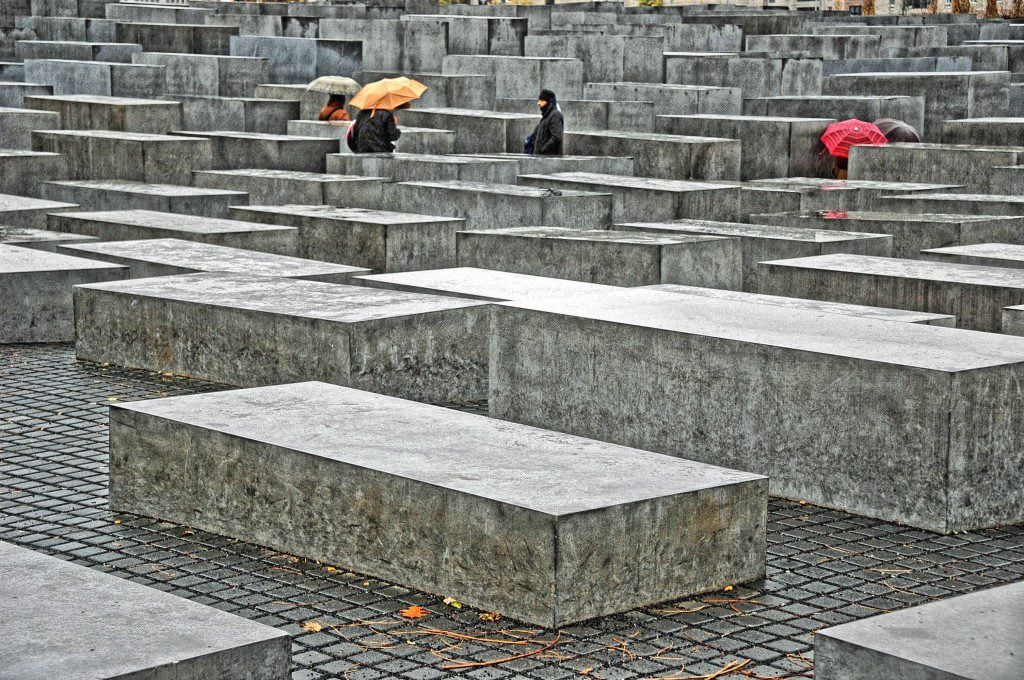
So over the weekend (as part of my overall effort to blog more often) I fretted about an apparent trend to “demote” the Holocaust, by turning it into just one among many genocides/mass killings, and just one lesson among many, in the general category of “tolerance” and “diversity.” And as a follow-up, I wanted to write a bit more on why it matters that we, as a part of “the West,” study and remember the Holocaust.
First: what was the Holocaust?
Looking at the various laws about Holocaust instruction reminded me of what seems to me to be an unsettled debate: does “the Holocaust” encompass all the Nazis’ murders in World War II, or specifically those of Jews? The various laws tend to define the Holocaust with the broader definition; if I look at the United States Holocaust Museum’s website, I see the more narrow definition, which I think is more appropriate. After all, here is the History Channel’s definition (which is fairly representative of the larger definition): “The Holocaust was the state-sponsored persecution and mass murder of millions of European Jews, Romani people, the intellectually disabled, political dissidents and homosexuals by the German Nazi regime between 1933 and 1945” — but only against the Jews and Romani was there systematic mass murder, or at least these were the only ones hunted down solely for their race/ethnicity, and fundamentally, even though, for instance, in Wikipedia, the latter case is called the “Romani Holocaust,” it has never seemed appropriate to me to combine them together. I know that there is a certain preference to include the euthanasia of the disabled as a part of the Holocaust, because of its status as a sort of “trial balloon” (that is, the narrative that the Nazis might not have moved on to genocide if enough people had fought against the T4 program) but, again, it’s not the same thing — not every repugnant thing the Nazis did is The Holocaust. And, again, sending political dissidents and Russian POWs to the horrendous conditions of the concentration camps or, at some points, for Russian POWs, to their deaths, was not a part of The Holocaust.
Second, what makes the Holocaust distinctive among genocides?
First, the magnitude of the killing.
Second, the fact that the killing was industrialized.
Third, the fact that it was perpetrated by “people like us” – simply put, even if you say, “we in the United States are not Germans” or claim on the basis of your own racial/ethnic background to have nothing to do with it, my point is that teh Germans were educated, modern, and secular — that is, the Holocaust didn’t have anything to do with “tribal” animosities or some kind of religious conviction.
And, finally, although their status in places like Poland is a different story, in Germany, Jews had been thoroughly integrated into the social and economic life of the country.
But here’s something that has bugged me periodically, and again when I was looking into legislation and other commentary earlier, and even regarding recent claims regarding Gaza and the Palestinians: there is a regular refrain that “Dehumanization is the first step towards genocide.” It’s used to police speech, by saying that anything that even resembles criticism is forbidden.
But here’s the reality of the Holocaust, based on everything I’ve read: the “dehumanization” of the Jews, the rhetoric that they were vermin, subhuman, that they needed to be exterminated without regrets, that even a small child could not be allowed to live — that was the effect, not the cause, of the Holocaust. These were words used by men who had already decided on the path of genocide. I’ve read several books on the topic of “how did individual men become killers?” and I vaguely recall that the architects of the Holocaust worried about the effect that mass shootings would have on the killers themselves, that they would be morally corrupted by their task; they imagined that instead somehow the men would or should just be methodical and clinical, if only they managed the process right. At the same time, some Nazi leader or another groused that Germans were willing to agree to the persecution of Jews, in general, but thought the Jews they were friendly with, should be exempt, and they needed to be persuaded to accept the necessity of a complete genocide. In other words, having decided upon mass murder, Nazis chose dehumanizing language to justify their plans and get others to accept them.
So how *should* the Holocaust be taught, if not with the instruction, “don’t ever use dehumanizing language because that will trigger others into perpetrating a genocide”?
In the first place, with a great deal of humility. So many people like to believe that they, themselves, would have fought against the Nazis and ensured that Hitler never would have risen to power, or that they would have hidden Jews, or joined the resistance or acted heroically in some other way. But the plain reality is that most of us wouldn’t have. What do we do with this awareness? I don’t know, really. I suppose that’s an exercise left to the reader, as they say . . .










